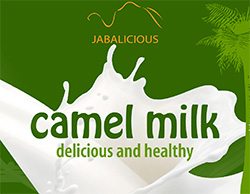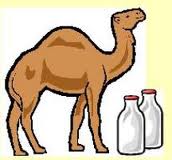I wasn’t really surprised to learn that camel milk is being promoted as a medicine. I long ago realized that the human power of belief is inexhaustible. The news did make me laugh, probably because camels are rather funny-looking animals, because I am easily amused, because it reminded me of some of my favorite camel jokes, and because it wouldn’t do any good to cry.
Camel milk has been claimed to cure or benefit patients with diabetes, tuberculosis, stomach ulcers, gastroenteritis, cancer, allergies, infections, parasites, autism, even AIDS. This isn’t really quite as silly as it might sound. PubMed does list several studies showing health benefits from camel milk. A handful of studies have suggested that camel milk improves control of blood sugar in diabetes, but they are preliminary studies that typically compare standard treatment to standard treatment plus camel milk rather than using a blinded control. There are also a few small, poor quality studies suggesting a possible benefit in allergies, in peptic ulcers, in infections such as hepatitis, and in schistosomiasis. All in all, the research doesn’t amount to much. Camel milk can only be classed as experimental treatment. The existing studies justify doing more (and better quality) research, but they don’t justify prescribing it to treat patients.
Among other properties, camel’s milk is high in vitamin C, low in vitamin A, and low in fat compared to cow’s milk, and it is tolerated by those who are lactose intolerant. It is different from cow’s milk in many other ways that I won’t attempt to list, but the clinical significance of those differences is not clear.
A couple of studies suggested reasons for caution. A study in Saudi Arabia, where brucellosis is endemic, showed that the main source of brucellosis infection was unpasteurized camel milk and there is a report of anaphylaxis to camel’s milk in a child with atopy.
The founder of the American Camel Coalition, Millie Hinkle, ND, says
The high levels of insulin in camel’s milk and the antibodies, which are much simpler in structure than human milk antibodies, enable it to penetrate deeper into the human tissue and cells [whaat?], which means that the milk has the potential to serve as a major weapon against many human illnesses.
She thinks that studies done in other countries on autism, diabetes, cancer, heart disease, Crohn’s, Parkinson’s, food allergies and a variety of other illnesses have been “impressive.” I couldn’t locate the studies she cites for some of these claims, and I didn’t think the ones I did find were “impressive.” The one she cites for autism is not original research but just a speculative rumination that includes brief, unconvincing reports of three patient observations and talks about highly controversial and disproven hypotheses as if they were proven facts. She wants to repeat previous studies using pasteurized camel milk; obviously pasteurization is a wise move, but rather than repeating previous studies, why not do better designed, controlled studies?
I didn’t know what to make of one study I found on PubMed. Its abstract said
Camels’ milk, women’s milk and cows’ milk were kept at 30 degrees C and refrigerated at 4 degrees C. This explains the necessity to immediately freeze milk if it needs to be kept even for a few days. Cows’ milk remained good for days if stirred and then turned sour, enabling the making of cheeses and butter. Camels’ milk did not sour at 4 degrees C for up to 3 months. This means that camels’ milk is mainly good only for drinking, as was promised to this animal by the Prophet.
Isn’t it inappropriate to make religious comments in scientific articles? Is religious support pertinent? In Sunni Islam, the Sahih Bukhari, one of the six major Hadith collections, does include several verses where the prophet Muhammad is said to have advocated drinking camel’s milk and urine as medicine. For instance,
The climate of Medina did not suit some people, so the Prophet ordered them to follow his shepherd, i.e. his camels, and drink their milk and urine (as a medicine). So they followed the shepherd that is the camels and drank their milk and urine till their bodies became healthy. Then they killed the shepherd and drove away the camels.
The Sahih Bukhari’s medical advice is not reliable or even consistent. It also says
Healing is in three things: A gulp of honey, cupping, and branding with fire (cauterizing). But I forbid my followers to use (cauterization) branding with fire.
Does that mean Muslims shouldn’t bother with any medical treatment but honey and cupping?
I’m not just picking on Muslims. Other religious texts also give questionable medical advice. In the Essene Gospel of Peace, Jesus gave detailed instructions for colon cleansing using river water and a long-necked gourd:
Seek, therefore, a large trailing gourd, having a stalk the length of a man; take out its inwards and fill it with water from the river which the sun has warmed. Hang it upon the branch of a tree, and kneel upon the ground before the angel of water, and suffer the end of the stalk of the trailing gourd to enter your hinder parts, that the water may flow through your bowels.
I’d rather drink camel milk than do that.
There is even a book Love Thine Enemas and Heal Thyself. One of the customer reviews on Amazon.com says “This book helps people understand the love of God, in a very intimate area.” You can find the darnedest things on the Internet! But I digress…
There is a website, Camel Milk for Health that recounts one (only one!?) story about a young man who had an undiagnosed condition that allegedly made him “allergic to all foods…unable to eat or digest any foods, unable to absorb any food nutrients” so that he was “subsisting on a tablespoon of rice and a tablespoon of rice milk per day.” Do you believe that? His parents claim he was cured by drinking camel milk, and they tell how they had to battle the authorities to get special permits to import the milk into Canada. The website announces a symposium to be held in Vancouver BC on February 9th with 3 panelists entitled “Camel Milk: A New Alternative Medicine.” The main speaker is a retired professor of veterinary medicine from Israel who has done some of the research. The symposium is sponsored by an orthodox Jewish congregation, the oldest and largest synagogue in Vancouver. I am puzzled, because camels and camel milk are trayf (not kosher) and are forbidden to orthodox Jews.
While looking for evidence of possible health benefits, I came across some intriguing camel trivia in the Wikipedia article:
- Camel milk can’t be made into butter by conventional churning methods.
- The Abu Dhabi Officer’s Club serves camelburgers. Bubonic plague has been transmitted by eating camel liver.
- The ancient Roman emperor Heliogabalus enjoyed eating camel’s heel.
- Camel blood is consumed in Northern Kenya.
- Camel lasagna is available in Alice Springs, Australia.
It’s nice to know these things. Forgive the digression.
If you want to try camel milk, you can’t. Selling it is illegal in the US. According to a CBS news report in July 2010,
The FDA allows people to drink camel milk, but it can’t be imported or sold in the U.S. until a test for drug residues is validated, said FDA spokesman Michael Herndon.
Could this be a conspiracy by Big Dairy to prevent competition?
The Camel Milk for Health website links to the Oasis Camel Dairy website, which is interesting and has some cool pictures. The OCD is producing camel milk but is not legally allowed to sell it. What they can and do sell is camel milk soap for $5.00 in varieties like “gold frankincense and myrrh” and “rosemary mint.” They also sell camel milk chocolate bars.
All of the research seems to be on one-hump camels. It’s not clear whether Bactrian camel milk is equally efficacious. The “one hump or two” question remains to be answered; but there’s no rush, since we can’t get either kind of milk. Jabalicious and other brands have recently come on the market in the UK, but those of us who live in the US will have to either wait for FDA approval or buy our own camel and milk it ourselves.


